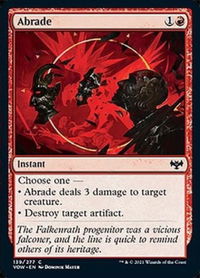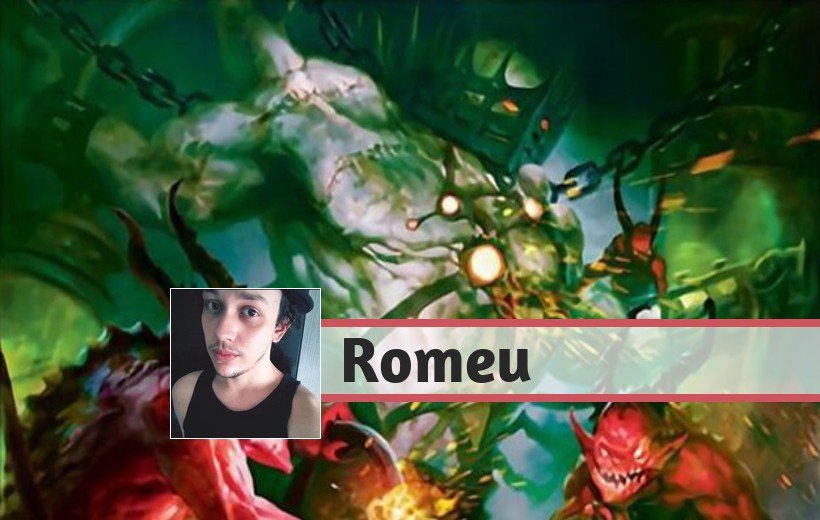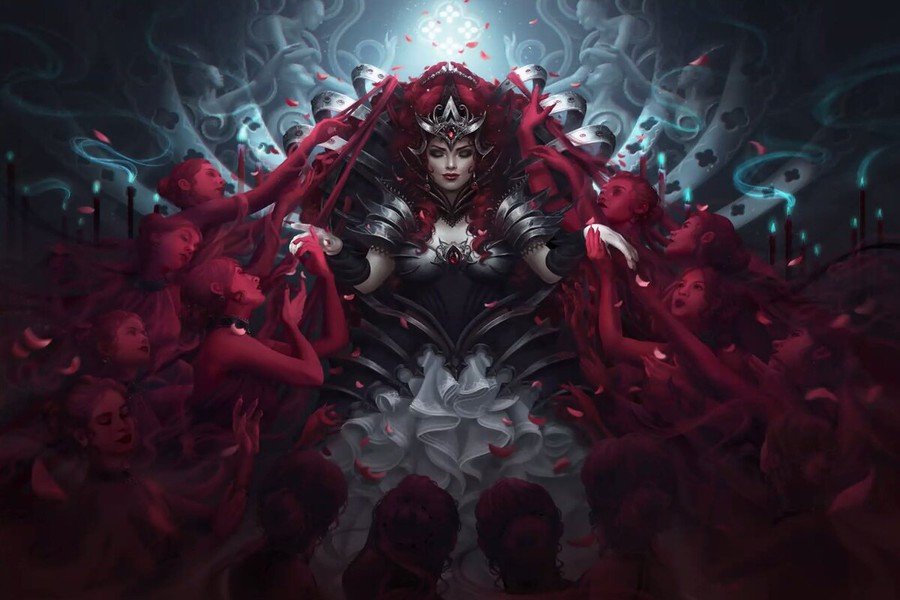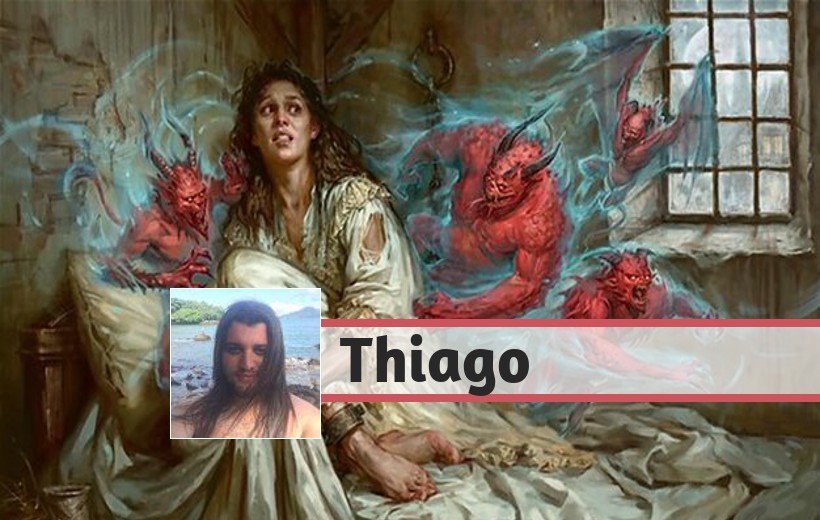The full spoiler for Innistrad: Crimson Vow has finally been released and, as usual, the review season at CardsRealm starts from this moment, where we carry out our analysis of the new cards based on a specific format.
And today, I'll be presenting you with my review of the new set, with my focus entirely on Pauper.
Crimson Vow's Mechanics & Pauper

Of all the mechanics in the new set, Blood has the most potential for Pauper.
First, Blood tokens are artifacts, which means they interact well with mechanics involving artifacts, which are currently present in the format: Affinity and Metalcraft.
Ad
Second, these cards are great enablers for Discard Outlets if cards that creates them are naturally good, which becomes very relevant for decks looking to discard things and/or take advantage of things replayed in the graveyard, such as Boros Bully, or lesser played decks like Madness, Reanimator, among others.
Finally, the token allows the player to “filter” their hand for a very low cost, which can be useful if the mechanic is coupled as an added value to another relatively good card for a given archetype.

I don't think any Disturb cards in the new set are relevant to the format, as all the Auras they transform into when cast from the graveyard are overpriced for the amount of mana you put into them, and none of those creatures look good enough on its own either, and neither it collaborates with an existing archetype.

Cleave has some interesting cards, but in general, the mechanic looks more like a "Kicker with a new name" than an exciting mechanic with relevant effects, and most of the commons with the ability don't seem exciting enough to deserve pay close attention in this review.
That said, let's go into the analysis:
White

Very few decks can really take advantage of Fierce Retribution's Cleave, but the ability to destroy an attacking creature for two mana at Instant-Speed on white makes this card deserving of an honorable mention, as we have many relevant targets for it today.

There are some Presence of Gond lists that tries to run Sigil of the Nayan Gods to increase a creature's power and attack in the same turn you perform the combo, or also to create an infinite mana combo with Devoted Druid.
Nurturing Presence works well in this slot, and may find a home in other combos that involve infinite ETBs, but it doesn't seem to make any of these decks competitive enough compared to the current Tier 1.

A slight upgrade to Righteous Blow, which some archetypes (especially White Weenie and the like) run occasionally.
Despite being a good card, it's not the removal that white-based decks really need or would like to have in the format, especially in a Metagame where we're facing 4/4 creatures, or creatures that grow significantly.

A Disenchant with an ‘upgrade’ of 3 life, but at Sorcery-Speed can have some utility, depending on how the Metagame develops.
The fact that the card is a Sorcery doesn't help much in fulfilling its role, as it's significantly inferior to Leave no Trace against Auras, or any of the more diverse answers against artifacts in Pauper today, but a nice addition, nevertheless, and faithfully represents how the power level of the common cards has risen.
On the bright side, Sanctify is a great answer against Curse of the Pierced Heart.

Another manasink for infinite mana combos, but one that only power up itself, which makes it less viable than we'd really like, as you'll usually need to spend an entire turn with it and the combo on the board to win the game through combat.
Ad
Blue

I saw some comments about this card today, but I think we have better options to delay the opponent's gameplan and/or protect threats in blue decks that would really be interested in Alchemist's Retrieval.

This is an interesting addition, as it is an Aura that can be played at Instant-Speed, and that offers, in addition to Hexproof, a permanent +1/+1 pump.
I mentioned Alchemist's Retrieval above, and Cradle of Safety is a great example of a card that works much better at protecting threats.
It's possible that Cradle of Safety might see play, although I'm not certain if decks like Mono-Blue Faeries would really like this enchantment, but the possibility of increasing your creature's power while protecting it might seem worth a try.

If we can cast any infinite spell loops, we can use Cruel Witness to mill our entire deck.
Now, where is Laboratory Maniac when we need it, in a common slot?
Jokes aside, there are better things to do with “infinite cast” combos in the format.

I really don't think this card is worth it in the vast majority of the format's archetypes, as Behold the Multiverse is a better fit for most of them, and Forbidden Alchemy and Pieces of the Puzzle are better if you want to put cards into the graveyard.
That said, it's possible that Scattered Thoughts has a home as a 1-of or 2-of in a Serpentine Curve deck.

Scale Up, but in the wrong color.
Unfortunately, the format's manabase and the existence of Snuff Out doesn't allow Simic Infect to be viable, with the only time we saw the archetype emerge being when Arcum's Astrolabe was legal.
However, perhaps this card can open up more possibilities for Blighted Agent and Ichorclaw Myr to enable different versions of the archetype, with less focus on a single attack and more focused on paced combat sequences, while cards like Cradle of Safety and others serve to increase your creatures' power while protecting them from removals and/or giving the necessary evasion.
Sounds like an interesting idea, though probably not competitive enough for a Challenge.
By the way, Serpentine Ambush is also an interesting option for other creatures that grow with spells, like Prowess or Kiln Fiend.
Black

For one mana, you get two artifacts on the board, with one of them serving to filter your hand, while the other can be used in late-game to return two creatures that died during the game, and when it comes to Affinity, we know that these two creatures can be the most diverse: Going from two copies of Myr Enforcer to a combination of Disciple of the Vault + Atog that can win the game on its own.
Witching Well is widely played in Affinity these days, and it won't surprise me if Blood Fountain becomes essential in the Rakdos versions of the deck, while competing with the Throne of Eldraine artifact in the Grixis versions, as both have different purposes, but with great utility in moments where the game is extended.
Ad

Dead Weight with advantages if any Vampire becomes widely played seems like an interesting option, and worthy of an honorable mention in this article, as Black Burn usually runs Pulse Tracker, Guul Draz Vampire and Changeling Outcast.

Several players and content creators have commented on this creature, and particularly I can't think of how it could be any better than other sac outlets we have on Pauper these days, especially since exiling a card from the opponent's hand is irrelevant if they're going to draw even more with their spells and effects.
EDIT: I think I need to explain a bit better what I mean with the phrase above.
Mindleech Zombie makes the opponent exile a card from their hand without any further advantage. You don't get information on their hand, you don't get to choose what they discard, and you need to exchange resources badly for its effect.
On the other side, most of the current meta decks have pretty good ways to replenish their hand with Dispute/Thoughtcast or Ninja/Cantrip or Monarch, Ornament, etc. so exiling one card from their hand with a one-time effect tacked on a sac outlet feels pretty underwhelming when they have much better means to recover from it.
In short, the creature itself does too little for its costs, and I would rather sacrifice a creature with Deadly Dispute than with Mindleech Ghoul.

Reassembling Skeleton tends to enable some interesting engines, but they usually aren't good enough in competitive formats, and I think Persistent Specimen follows the same pattern, but as a common.
The best use I can think of for this creature is as a recurrent sac outlet, which can be reused with Carrion Feeder, Makeshift Munitions or Thrull Surgeon, cards that sees some occasional play, while it can also be played as an early game blocker, or to be sacrificed with effects like the aforementioned Deadly Dispute.

I'd really like to get a little more excited about Rot-Tide Gargantua, after all it's a 5/4 creature for five mana that offers an ETB that may be an edict effect against the opponent.
However, the era where players sought to use their creatures "on-curve" in Midrange games has long since passed, and even if it hadn't, Predatory Nightstalker has always been in the format and never saw much play.

Honorable mention, we never know when one more version of Undying Evil will be needed.
After all, Undying Evil has seen a lot of play on Pauper in a time without Monarch and a lower power level (but which, for some irony, contained some powerful cards, like Gush), where you replayed cards like Mulldrifter, just as we do today, much more efficiently with Ephemerate.

Decks like Black Burn might be interested in this card, as it offers damage and good card filtering by two mana, but it's competing slots with Sovereign's Bite, and particularly I think, for an archetype trying to play “under” opponents and winning the game in a few turns, 1 more damage is more relevant than the possibility of discarding bad topdecks.
Ad
Red

A good reprint, with a much better illustration, and again coming out as a common, deserves the honorable mention, as Abrade is still very useful for the format today.

Wizards have been trying to make a Red-Based Spellslinger archetypes work on Pauper for over a year now, and Ancestral Anger grants redundancy along with Crash Through to Trample a creature while also drawing a card, which seems very relevant to me, so these decks can keep their engine flowing.
The +X/+0 bonus doesn't seem likely to happen often, but it can occasionally make a difference if the game gets extended.

Some decks choose to run Blazing Volley instead of Electrickery on their lists, and End the Festivities is a great upgrade as it also deals damage to the player, something that might be relevant if your deck cares about dealing damage, like Burn, or being aggressive, like Goblins, or Red Deck Wins.

A lot has been said about this creature across the Pauper community, and particularly I believe this card is the second best in the set for the format.
However, unlike what many players have mentioned on social networks, I can't imagine this card replacing absolutely nothing in Burn, merely because the slots it could belong to have functions very pertinent to the current composition of the archetype.
You prefer not to take out spells to put Kessig Flamebreather on the list, so on most Burn lists, it's competing with Thermo-Alchemist, Ghitu Lavarunner, and Curse of the Pierced Heart.
Starting with Ghitu Lavarunner, I think this is, although I don't recommend, the most plausible card to remove from Burn to test Kessig Flamebreather on Maindeck, which is due to the current state of the Metagame, where Ghitu Lavarunner is stopped by just about any blocker in the major decks these days, while the new creature can deal some damage on an empty board, but offers greater reach depending on how you cast your spells.
The concession you make by removing Ghitu Lavarunner is losing some speed in less interactive matchups, where there aren't as many blockers on the board, and also losing that 2 more damage in the second turn when your early-game includes two spells on turn 2, so you're essentially “delaying” an entire turn.
Plays involving Rift Bolt on Early-Game are also significantly worse with Kessig Flamebreather than with Ghitu Lavarunner, as the card has no immediate impact on the board, thus being a bad turn 2 drop.
And here comes Thermo-Alchemist and Curse of the Pierced Heart: Both cards also don't offer immediate impact, but they do offer something Burn needs to win games: inevitability.
Both cards deal damage on their own, requiring no support or backup, while Kessing Flamebreather requires you to play spells from your hand to be good at a board with creatures, making it a bad topdeck and a bad creature in case you don't draw what you need.
Ad
This inevitability is essential to Burn, as you cannot guarantee that the right sequencing of your hand will be enough for you to win the game, and any excess damage you can deal with your cards is crucial to keep the pressure on the opponent, and reduce the number of turns needed for victory.
So, I don't think Kessig Flamebreather will see play on Burn out of occasional copies on the Sideboard, where it can replace Firebrand Archer.
But that doesn't mean the creature won't see play in the format: It adds redundancy to any archetype that tries to abuse casting spells to deal damage, and that includes decks like Galvanic Storm, which have been gaining more cards with recent releases, and it may be very close to being a defined archetype in Pauper.
Another archetype that can also benefit from this card is Eggs, which still doesn't have the consistency needed to be considered relevant (and Kessig Flamebreather isn't exactly what the deck needs for that), but has just gained redundancy at its winconditions, alogn with Reckless Fireweaver and/or Disciple of the Vault.

The other most talked card by the community and, for me, the best card of this set for Pauper is Reckless Impulse which, like Kessig Flamebreather, seems to have its use being misunderstood by players: You don't run Light up the Stage on spell-based Burn lists, you use them on creature-based Burn decks.
I think players can try playing Reckless Impulse on Burn instead of Needle Drop, but I'm not certain whether it's a good option.
First, this spell costs two mana, a cost that is relatively important for Burn's sequencing, especially in the current lists, which play with practically 15 Mountains and 2 Forgotten Cave, and as much as flooding is a possibility and, occasionally, a problem for the deck, the archetype plays so aggressively with its own lands and with mana efficiency that often you'll be just passing the turn when you cast Reckless Impulse, either because you played it too soon, or because of the amount of Fireblasts you've cast.
I really like the possibility of giving Burn some fresh air, the archetype needs that to stay in the Metagame these days (and it also needs an effect like Skullcrack, but I don't think it will ever happen), but I don't know if Reckless Impulse is the exact card that Burn currently needs for this function.
On the other hand, I really like this new addition to add consistency to the Mono-Red Kiln Fiend decks that occasionally pop up in Leagues and independent events, and I can tell you that it seems to be a Wizards' goal to give proper support to these lesser used archetypes by bringing these new cards as commons.

Thraben Inspector has seen and still sees play on Pauper, and Voldaren Epicure is a red version of the card, with a token that offers some draw filtering and a discard outlet, as well as being a creature 1 /1 that deals 1 damage to the opponent merely for entering the battlefield.
Ad
I'm not sure if there's room in the format for it these days, but the card definitely has some value for players to consider.
Green

NOTE: I've read this card wrong, it doesn't gain life by itself. Thus, it is pretty bad. Move on to the next one, thanks!

I don't know if I like this card for Stompy, as it competes with other more interesting effects for the deck's game plan, like Savage Swipe, but I particularly like this inclusion for Mono-Green Infect, as another means to give evasion to one of your creatures, while also protecting it from some removals and/or making it survive combat.

I believe this will be as close as the format can get to Boneyard Wurm or other creature variants whose power increases with the number of cards in the graveyard.
Maybe it's possible to try to create some Combo Deck that tries to have a huge number of creatures in the graveyard to turn Moldgraf Millipede into a gigantic threat, but it seems too much work and susceptible to too much hate to work in a format where we have Gurmag Angler and Hooting Mandrils, which act as impactful threats for one mana.
Artifacts

Currently, Bonder's Ornament is the best mana rock Pauper has, as it offers both ramp and card advantage in a single card.
However, in a world where Tron again becomes a predominant deck, or where Bonder's Ornament by some chance gets banned, it is possible that Honored Heirloom may have room on decks that use the ramp to get a Maindeck answer to cards like Mnemonic Wall or Pulse of Murasa.

One more artifact for the cycle of cards that interact incredibly well with Kor Skyfisher while having other functions.
Among the options we currently have in the format, Wedding Invitation isn't the most exciting for Kor Skyfisher decks, and although it has some very interesting interactions on Affinity, like giving Atog another way to win the game on its own while drawing a card, but I believe Fling works better on the "free win" category.
Conclusion
That was my Innistrad: Crimson Vow Pauper Review!
In my view, the set demonstrates again how the power level of common cards has increased over the past two years, with some additions that I previously believed we would only see in special sets, like a Masters set, or Modern Horizons.
Tweaked versions of effects like Light Up the Stage are very nice surprises, while stronger versions of existing cards like Kessig Flamebreather are also very welcome in the format.
Another interesting point I've noticed in the last two sets is how much Wizards have been working on adding commons that don't become instant and obvious inclusions in well-established archetypes, but bring powerful additions to decks that aren't on the format's Tier 1 currently, but which are widely known by the community, such as Aristocrats, Mono Red Blitz, or Infect.
Ad
Of course, we always get an addition or two that impacts one of the main decks, and I think we'll see that happen with Crimson Vow as well, but its focus seems much more focused on reinforcing archetypes that aren't at the top, the which presents itself as a great way to try to diversify the format.
That said, I'm very intrigued to see how the new cards will affect Pauper, both in the competitive Challenges environment and in independent tournaments, and I hope that Kamigawa: Neon Dynasty will continue to bring even better additions to the format!
Thanks for reading!








— Comentarios0
Se el primero en comentar